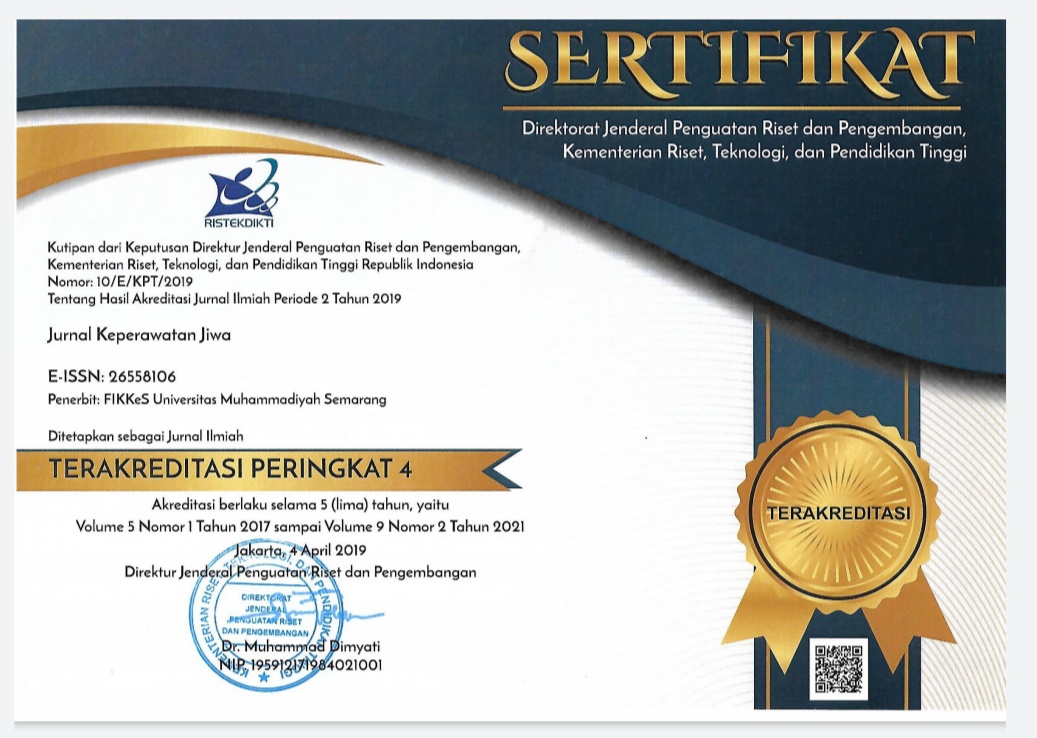Aromaterapi Lavender Menurunkan Skor Edinburgh Postpartum Depression Scale pada Ibu dengan Postpartum Blues
(1) Jurusan Kebidanan, Poltekkes Kemenkes Mamuju
(2) Departemen Obstetri Ginekologi, Fakultas Kedokteran, Universitas Brawijaya
(3) Departemen Patologi Klinik Fakultas Kedokteran, Universitas Brawijaya
(*) Corresponding Author
Abstract
Pendokumentasian kejadian postpartum blues belum banyak dilakukan oleh fasilitas pelayanan kesehatan di Indonesia. Dari hasil penelitian sebelumnya, kejadian postpartum blues mencapai 74,4%. Kondisi ini harus menjadi perhatian karena 10-18% dapat berkembang menjadi depresi postpartum yang memiliki dampak negative terhadap kesehatan ibu serta mempengaruhi interaksi antara ibu dan bayinya. Tujuan penelitian ini yaitu untuk mengetahui pengaruh aromaterapi lavender terhadap skor EPDS ibu dengan postpartum blues. Penelitian quasi eksperimen dengan desain Pretest-Posttest Control Group yang dilakukan pada April s/d Mei 2019 di 3 Puskesmas. Populasi dalam penelitian ini adalah ibu yang mengalami postpartum blues di tiga Puskesmas lokasi penelitian berdasarkan hasil skrining sebanyak 33 orang. Sampel dipilih dengan menggunakan metode non probability sampling yaitu dengan purposive sampling sehingga didapatkan sampel sebanyak 28 orang dibagi dalam 2 kelompok yaitu kelompok perlakuan dan kontrol. Grup intervensi diberikan aromaterapi lavender sebanyak 5 tetes pada kapas yang dihirup selama 15 menit sebanyak dua kali dalam seminggu selama 4 minggu. Data skor EPDS dianalisis menggunakan Wilcoxon signed-ranks test. Hasil analisis menunjukkan tidak ada perbedaan yang bermakna skor EPDS pada kelompok kontrol (p=0,410> 14âˆ"> ). Sedangkan pada kelompok perlakuan (p=0,001< 14âˆ"> ), menunjukkan terdapat perbedaan yang bermakna sebelum dan setelah pemberian aromaterapi lavender. Dalam penelitian ini, diketahui bahwa aromaterapi lavender dapat menurunkan skor EPDS pada ibu yang mengalami postpartum blues sehingga efektif untuk mengatasi kejadian postpartum blues.
Keywords
Full Text:
PDFReferences
Bhusal, B. R., Bhandari, N., Chapagai, M., & Gavidia, T. (2016). Validating the edinburgh postnatal depression scale as a screening tool for postpartum depression in kathmandu, Nepal. International Journal of Mental Health Systems, 10(1), 1–7. https://doi.org/10.1186/s13033-016-0102-6
Conrad, P., & Adams, C. (2012). The effects of clinical aromatherapy for anxiety and depression in the high risk postpartum woman - A pilot study. Complementary Therapies in Clinical Practice, 18(3), 164–168. https://doi.org/10.1016/j.ctcp.2012.05.002
Dean, J., & Keshavan, M. (2017). The neurobiology of depression: An integrated view. Asian Journal of Psychiatry, 27, 101–111. https://doi.org/10.1016/j.ajp.2017.01.025
Fitriana, L. A., & Nurbaeti, S. (2015). Gambaran kejadian postpartum blues pada ibu nifas berdasarkan karakteristik di Rumah Sakit Umum Tingkat IV Sariningsih Kota Bandung. Jurnal Pendidikan Keperawatan Indonesia, 2(1), 44–51.
Ghaedrahmati, M., Kazemi, A., Kheirabadi, G., Ebrahimi, A., & Bahrami, M. (2017). Postpartum depression risk factors: A narrative review. Journal of Education and Health Promotion, 6, 60.
Kianpour, M., Mansouri, A., Mehrabi, T., & Asghari, G. (2016). Effect of lavender scent inhalation on prevention of stress, anxiety and depression in the postpartum period. Iranian Journal of Nursing and Midwifery Research, 21(2), 197. https://doi.org/10.4103/1735-9066.178248
López, V., Nielsen, B., Solas, M., Ramírez, M. J., & Jäger, A. K. (2017). Exploring pharmacological mechanisms of lavender (Lavandula angustifolia) essential oil on central nervous system targets. Frontiers in Pharmacology, 8(MAY), 1–8. https://doi.org/10.3389/fphar.2017.00280
Mohammad-Alizadeh-Charandabi, S., Effati-Daryani, F., Mirghafourvand, M., Taghizadeh, M., & Mohammadi, A. (2015). Effect of Lavender Cream with or without Foot-bath on Anxiety, Stress and Depression in Pregnancy: a Randomized Placebo-Controlled Trial. Journal of Caring Sciences, 4(1), 63–73. https://doi.org/10.5681/jcs.2015.007
Mursidin, W. O. M., Ernawati, D., ST, S., & Keb, M. (2017). Gambaran Kejadian Postpartum Blues Pada Ibu Postpartum Di Rs Pku Muhammadiyah Yogyakarta. Universitas’ Aisyiyah Yogyakarta.
O’hara, M. W. (1987). Post-partum ‘blues,’depression, and psychosis: a review. Journal of Psychosomatic Obstetrics & Gynecology, 7(3), 205–227.
Rai, S., Pathak, A., & Sharma, I. (2015). Postpartum psychiatric disorders: Early diagnosis and management. Indian Journal of Psychiatry, 57(Suppl 2), S216.
Sánchez-Vidaña, D. I., Ngai, S. P. C., He, W., Chow, J. K. W., Lau, B. W. M., & Tsang, H. W. H. (2017). The Effectiveness of Aromatherapy for Depressive Symptoms: A Systematic Review. Evidence-Based Complementary and Alternative Medicine, 2017. https://doi.org/10.1155/2017/5869315
Shrestha, S. D., Pradhan, R., Tran, T. D., Gualano, R. C., & Fisher, J. R. W. (2016). Reliability and validity of the Edinburgh Postnatal Depression Scale (EPDS) for detecting perinatal common mental disorders (PCMDs) among women in low-and lower-middle-income countries: A systematic review. BMC Pregnancy and Childbirth, 16(1). https://doi.org/10.1186/s12884-016-0859-2
Yamamoto, K. I., Shinba, T., & Yoshii, M. (2014). Psychiatric symptoms of noradrenergic dysfunction: A pathophysiological view. Psychiatry and Clinical Neurosciences, 68(1), 1–20. https://doi.org/10.1111/pcn.12126
Article Metrics
Abstract view : 700 timesPDF - 185 times
DOI: https://doi.org/10.26714/jkj.9.3.2021.589-596
Refbacks
- There are currently no refbacks.

This work is licensed under a Creative Commons Attribution 4.0 International License.
PPNI Univ. Muhammadiyah Semarang
Jl. Kedungmundu Raya No. 18 Semarang Gedung NRC University of Muhammadiyah Semarang
Phone: 02476740287
Fax: 02476740287
Email: [email protected]
This work is licensed under a Creative Commons Attribution 4.0 International License.


